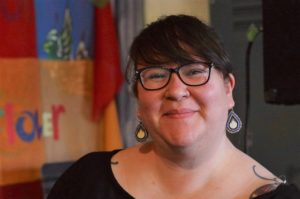Sagamok comedian takes different approach to storytelling

By Rick Garrick
TORONTO—Sagamok Anishnawbek comedian and storyteller Denise Booth McLeod emphasized the importance of humour for Indigenous people during the Toronto Storytelling Festival’s Honouring the Elders with Humour storytelling session.
“The only way we were able to survive was to make jokes,” says McLeod, a member of the Manifest Destiny’s Child Indigenous women’s comedy collective and an instructor at George Brown College. “If you ever have the honour and privilege of sitting at a kitchen table with a bunch of Indigenous women, you can hear some of the most raw, real joyous belly laughs that you will remember for the rest of your life. It’s pure and it’s real and it’s just the very strongest picture that I can paint of resiliency.”
McLeod shared the stage with Métis Elder Ron Evans, who grew up with one of the last nomadic Métis groups on the prairies, during the March 23 storytelling session at A Different Booklist Cultural Centre in Toronto.
“The crowd was really excited and hungry to hear more Indigenous stories,” McLeod says. “I rarely get to tell stories with an Elder, especially someone from so far away, so it was a pretty big honour and I felt really good doing that.”
McLeod says she has been telling jokes or stories for about four years as part of Manifest Destiny’s Child, which includes seven other Indigenous women.
“People really want to hear about Indigenous realities in a funny way,” McLeod says. “We tell stories around Toronto [and] we’re starting to get requests to go outside of Toronto. A few of us have gone to Wiikwemkoong and a few of us are going to Christian Island.”
McLeod says Indigenous comedians and storytellers are helping to break stereotypes about Indigenous people.
“For Manifest Destiny’s Child, there’s eight of us who aren’t a stereotype of Indigenous women,” McLeod says. “And we all have eight very different stories to tell and share and laugh about.”
McLeod brought up her background of being scooped up and raised by non-Indigenous parents in the Jane and Finch area of Toronto during the Honouring the Elders with Humour storytelling session.
“We tell stories about what we know, and so mine is a lot about being urban, and very proudly urban,” McLeod says. “And [about] that stereotype that all Indigenous people live on the reserve and we are all very mystical, I don’t go north of Steeles [Ave.] ever. Why would you go north of Steeles? Everything that you need is in Toronto. I often joke like I’m a lifelong New Yorker and never leave the island. Why would you ever go anywhere?”
McLeod also raised the issue of how Indigenous women are being stereotyped as Missing and Murdered Indigenous Women and Girls.
“While it is important for Canada to know those stories, and we need to talk about them, it then turned into this stereotype that all of us are murdered and missing,” McLeod says. “While we need to talk about it and the eight members of the group have all been affected by that narrative in one way or another and we are all advocates for Sisters in Spirit and for Missing and Murdered Indigenous Women and Girls, we need to also break the stereotype of that’s the only way Indigenous women are viewed in the country.”
The Toronto Storytelling Festival was held from March 2-4 and March 19-25 at 25 venues in Toronto, with about 80 storytellers sharing stories at about 95 events.


